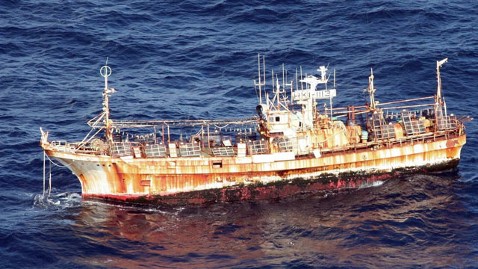US Coast Guard Blasts Japanese Ghost Ship to Sink It

The U.S. Coast Guard fired its guns on a derelict Japanese fishing boat today, attempting sinking it to the bottom of the ocean after a Canadian ship decided it wasn't worth towing for salvage.
After an initial volly of cannon fire, the ship burst into flames and began to list, The Associated Press reported. About two hours later, however, it still hadn't sunk, and so the Coast Guard opened fire again.
It finally sank at 10:15 ET, or 6:15 p.m. Alaska time, the Coast Guard said.
The Coast Guard's plans to sink the ship, which was set adrift by last year's tsunami, were initially put off when the fishing ship Bernice C claimed salvage rights. Those rights were abandoned after an inspection showed the ship was not worth saving.
The Japanese ship, Ryou-Un Maru, floated across the Pacific Ocean after it was ripped from its moorings by the tsunami last March. It is floating roughly 195 miles south of Sitka in the Gulf of Alaska.
Japanese Coast Guard spokesman Masahiro Ichijou said the vessel belonged to a fishing company in Hokkaido, Japan's northernmost island. It had been used for squid fishing before being put up for sale because of it's advanced age. It has no lights or communication systems. Coast Guard officials decided to sink the ship amid fears that it could disrupt traffic as it drifted through shipping lanes or spill fuel from its 2,000 gallon tank should it run aground.
"It's safer to mitigate the risks now before there's an accident or environmental impact," Coast Guard spokesman Petty Officer Charley Hengen told The Associated Press
The decision came after a review by The National Oceanic and Atmospheric Administration and the Environmental Protection Agency determined the best course of action would be to sink the ship with cannons and let any fuel evaporate in the open water.
About 5 million tons of debris were swept into the ocean by the tsunami, which also triggered a nuclear crisis at the Fukushima power plant. Alaska state health and environmental officials have said there's little chance that debris landing on Alaska shores will be contaminated by radiation from the disaster.
The Associated Press contributed to this report.